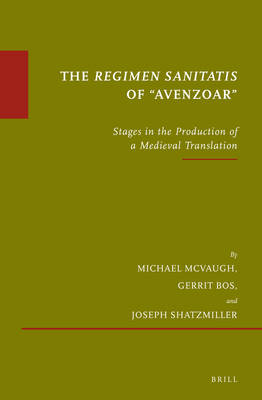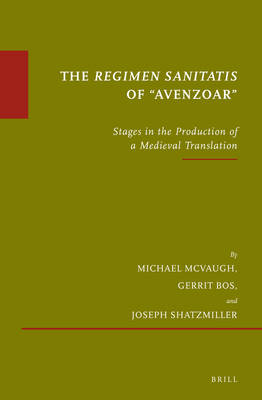
- Afhalen na 1 uur in een winkel met voorraad
- Gratis thuislevering in België vanaf € 30
- Ruim aanbod met 7 miljoen producten
- Afhalen na 1 uur in een winkel met voorraad
- Gratis thuislevering in België vanaf € 30
- Ruim aanbod met 7 miljoen producten
Zoeken
The Regimen Sanitatis of "Avenzoar"
Stages in the Production of a Medieval Translation
Michael R McVaugh, Gerrit Bos, Joseph Shatzmiller
€ 276,45
+ 552 punten
Omschrijving
The authors publish a previously unedited Regimen of Health attributed to Avenzoar (Ibn Zuhr), translated at Montpellier in 1299 in a collaboration between a Jewish philosopher and a Christian surgeon, the former translating the original Arabic into their shared Occitan vernacular, the latter translating that into Latin. They use manuscript evidence to argue that the text was produced in two stages, first a quite literal version, then a revision improved in style and in language adapted to contemporary European medicine. Such collaborative translations are well known, but the revelation of the inner workings of the translation process in this case is exceptional. A separate Hebrew translation by the philosopher (also edited here) gives independent evidence of the lost Arabic original.
Specificaties
Betrokkenen
- Auteur(s):
- Uitgeverij:
Inhoud
- Aantal bladzijden:
- 252
- Taal:
- Engels
- Reeks:
- Reeksnummer:
- nr. 79
Eigenschappen
- Productcode (EAN):
- 9789004406445
- Verschijningsdatum:
- 25/07/2019
- Uitvoering:
- Hardcover
- Formaat:
- Genaaid
- Afmetingen:
- 165 mm x 241 mm
- Gewicht:
- 498 g

Alleen bij Standaard Boekhandel
+ 552 punten op je klantenkaart van Standaard Boekhandel
Beoordelingen
We publiceren alleen reviews die voldoen aan de voorwaarden voor reviews. Bekijk onze voorwaarden voor reviews.








